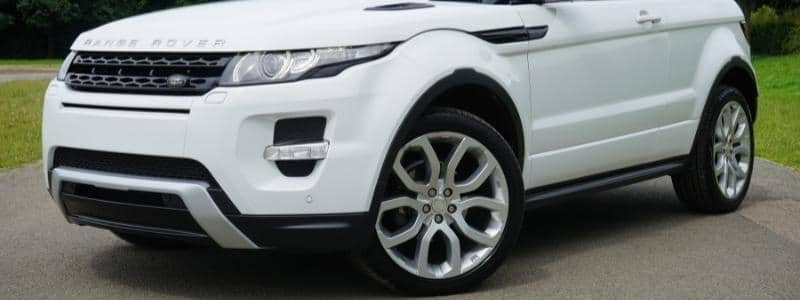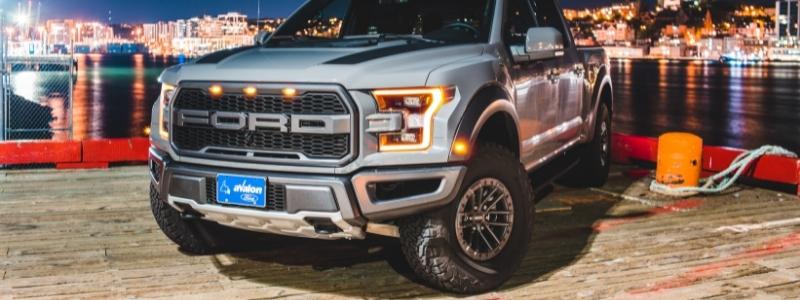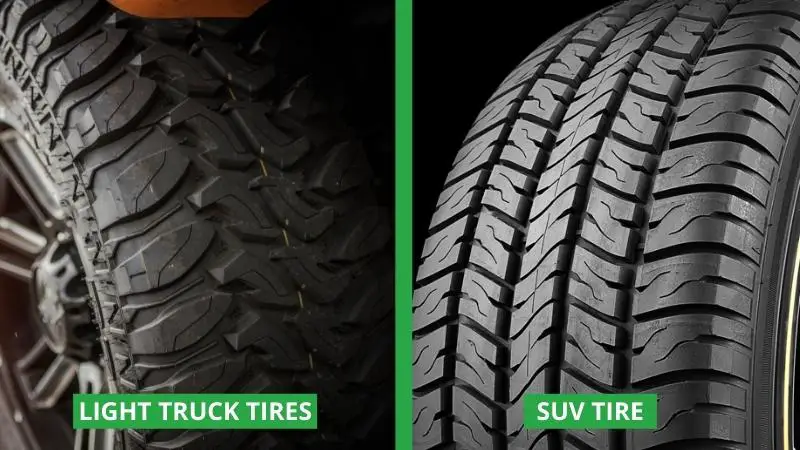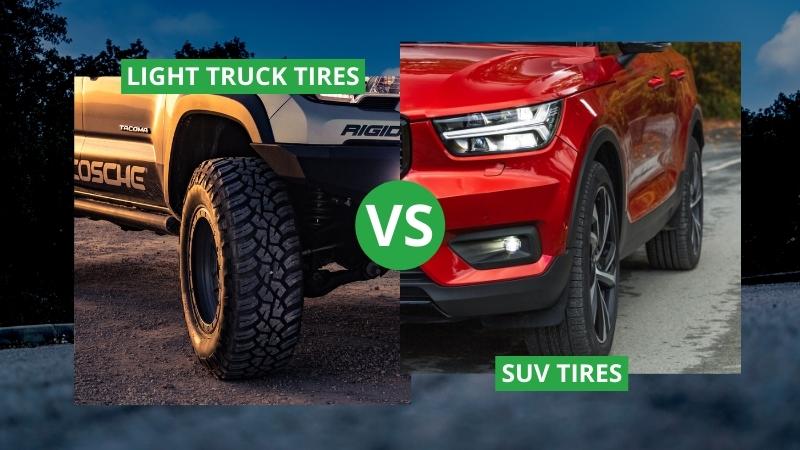SUV and light truck drivers always have numerous options when it comes to replacing their tires.
Light truck tires and SUV tires have been used interchangeably for a long time, and it seems like a common thing for drivers to do.
But, is it a good idea to use them interchangeably?
Well, these two tire types are built with different designs for different purposes. Sure, they may look similar because they both feature bulky and aggressive treads, taller sidewalls, blocky tread patterns, deeper sipes, and rugged rubber designs. However, some slight adjustments to their features make these two tire categories different.
When buying tires, most individuals look at the prices, performance, and longevity. While these are vital considerations, people must pay more attention to the tire specifications to maximize tire performance, whether highway, all-terrain, or mud-terrain.
Here we look into details what make the SUV and light truck tires different and how they perform against each other.
What Are SUV Tires?

SUV tires are usually marked as “P” tires because some manufacturers consider them suitable for passenger cars as well. These tires have evolved in their application from cars and can now be used for pickup trucks, vans, and station wagons.
The tires are lighter than light-truck tires and have low rolling resistance and minimal compact tread designs.
The tires are designed to drive on standard road terrains and handle off-road expeditions. In addition, SUV tires are good for smooth and comfortable rides both on-road and off-road because manufacturers have different designs for specific terrains.
What Types of SUV Tires Are There?
1. Highway Terrain tires
Highway terrain SUV tires are manufactured for driving on tarmac and paved highways. These are all-purpose tires that are commonly fitted at the factory.
They are designed to maneuver through all kinds of terrains only that they cannot withstand prolonged, extensive off-road use. They have minimal noise and have maximum comfort and longevity.
2. All-Terrain Tires
Most SUV tires for all-terrain use have the AT abbreviations on the sidewalls. They are compatible with on and off-road usage. Drives can install them for driving on rugged roads or pavement and driving around town.
They have a more aggressive construction compared to the highway-terrain tires, meaning they can get some what uncomfortable to drive with, especially on tarmac and other flat/clean surfaces. They are also noisy and less durable.
3. Mud Terrain Tires
Mud terrain tires are primarily built for use on rugged terrains to handle extreme road conditions. They are specialized to provide enough traction when driving on unpaved and rocky trails.
They feature the most rugged designs and aggressive tread patterns to match the driving conditions. The extra ruggedness leads to an uncomfortable and noisy ride. These are not recommended for daily use.
4. All-Season Tires
All-season tires are as the name suggests designed to be used during all seasons, i.e. winter, spring, summer and fall.
The all-season tire is made with a rubber compound that can handle both colder and warmer weather, making it safe to use year around.
On top of this, the all-season tire also comes with special sipes that are designed to effectively push water, snow and mud away from the tire allowing for good grip during any weather condition. It also comes with multiple smaller sipes that are designed to grip well on snow.
What Are Light Truck Tires?

Light truck tires are usually abbreviated as “LT” tires and are built to carry heavy loads, drive off-road, and tow other vehicles. The engineering of these tires allows them to work under extreme conditions, even when carrying heavy loads. These tires can be inflated to higher pressures above the maximum rating.
The extra air pressure these tires can carry enables them to manage the vehicle’s weight. They also feature deep tread depths, suitable for driving in off-road conditions. In addition, the aggressive sidewall and shoulder construction enables handling heavy loads without bending the tire.
When changing LT tires on a vehicle, they should always be replaced with a newer set of LT tires. Replacing them with P tires could affect the loading capacity.
What Types of Light Truck Tires Are There?
Light truck tires are primarily used for business and personal purposes. This means that manufacturers will make different tires to fit these applications. Every driver should know the type of tire they are buying, not to confuse it with SUV tires.
1. All-Season Luxury Crossover Tires
This tire is known as the jack-of-all-trades of light truck tires. It is designed with full-depth tread sipes with great material endurance that offer smooth rides and stable driving all year round.
They are the comfortable tire choice for driving in environments with changing temperatures, whether snowy, wet, or dry roads. They primarily have symmetrical tread designs with circumferential grooves.
2. All-Terrain Truck Tires
The all-terrain light truck tire is the most popular tire of all. These tires offer an outstanding balance on uneven road surfaces.
The sidewalls are also strengthened to prevent punctures. In addition, the additional treads avoid the impact of sand and mud on the ride. The feature tread design is more aggressive than trail and highway tires.
All-terrain light truck tires are easy to drive with minimal discomfort, which improves traction when driving off-road.
3. Highway-Terrain Light Truck Tires
Highway tires have treads that can handle heavy loads of SUVs and trucks. They are built to be comfortable when driving on pavements. They also feature durable compounds and tread patterns that are resistant to damage.
Such additions resist uneven wearing of the wheels and provide a long-lasting tread life, and generally have better siping for improved all-season traction.
4. Mud-Terrain Light Truck Tires
Drivers who prefer driving through sand, mud, and rocks instead of smooth roads will enjoy the reliability and versatility of mud-terrain light truck tires.
These tires have extra silica, which stiffens the tread blocks to reduce noise as you drive. The sidewalls are also reinforced to prevent damages from punctures, abrasions, and tears common with off-road driving. The only issue is that their tires are not as aggressive as other light-truck tire options.
Differences Between SUV Tires and Light Truck Tires

1. Tread Designs
SUV tires are built with aggressive treads for increased grip and traction for off-road capabilities. They have huge tread blocks for rugged roads to make the tires long-lasting.
On the other hand, light truck tires are engineered with compound treads that give a more aggressive look than SUV tires. The sidewalls are also reinforced with rigid rubber to make them stable even when subjected to heavy loads.
2. Design Intent
SUV tires are built for carrying heavy cargo with knobby treads that can handle muddy, sandy, or highway surfaces. They are much safer for all drivers and aim at providing ultimate comfort to those buying them.
On the other hand, light truck tires also feature aggressive designs for managing extra loads. However, their capabilities are further enhanced to perform better than SUV tires. For example, the tires can have more load ratings meaning more pressure can be added to accommodate the extra weight without flattening the wheels.
3. Tire Lifespan
SUV tires are durable because they are built with harder rubber compounds that withstand different driving techniques. Other SUV tires also feature distinct tread patterns for various terrains.
This means that if you use a particular tire on the road conditions it is not designed for, you are subjecting it to wear and tear. For example, HT SUV tires will not perform better on mud terrains and will wear out quickly due to abrasions and punctures.
Alternatively, light truck tires are usable on all terrains despite having multiple categories. These tires have rubber compounds on the sidewalls that prevent punctures, abrasion, and damage when driving on muddy or rocky terrains. The tread depth also ensures the tires last longer beyond their expiry dates.
4. Renewability
Although SUV tires are engineered to last long, they are subject to wear and tear when used for more extended periods. This means that the buyer will have to get a new set of tires once the tread depth is reduced beyond use.
Today, light-truck tires feature an under-tread or sub-tread within the top steel belt and tread. Most have “REGROOVABLE” markings on the side, which means that if the tread is down beyond the legal limits, deeper grooves can be carved in the rubber left on the tires for continued use.
These tires can also add an extra layer of tread when the initial tread wears out. The original thread will be removed and a new one added to the tire to look good as new.
5. Price
SUV tires are cheaper than light-truck tires because they feature less modifications. Light-truck tires are more like improved SUV tires because they can be used interchangeably.
Light truck tires are more expensive because they feature more aggressive treads for long-distance driving. They are also designed to last longer than SUV tires and adequately handle all terrains.
SUV tires will need to be serviced or changed after five years, while light truck tires can be used for up to 10 years before taking them for service or changing them.
Conclusion
Tires play a crucial role for vehicles, because without them, we would not be able to transport people and goods.
SUV tires and light truck tires are built to be durable and solid enough to meet the standard weight requirements. These tires are broken down into multiple sub-categories for application in different terrains.
Light truck tires are primarily designed to handle extra load compared to SUV tires. In addition, they can be used interchangeably by drivers who want to enjoy a different driving experience. However, it is not wise for drivers to use SUV tires on light trucks because they tend to wear out faster.
Conversely, SUVs using light truck tires tend to get a more aggressive look and superior performance. Light truck tires can also last longer on a SUV considering they are working far below their maximum load rating.
The only drawback of using LT tires on a SUV is often reduced comfort since the tires are a lot harder and sturdier than SUV tires are.
Hi, my name is Niklas, the head content creator & CEO of Whirling Wheelz. I am very interested in vehicles of all kinds, mainly cars. I have a car mechanics degree from high school and a big hobby of mine is to follow the WRC (World Rally Championship) both online and through travel.


